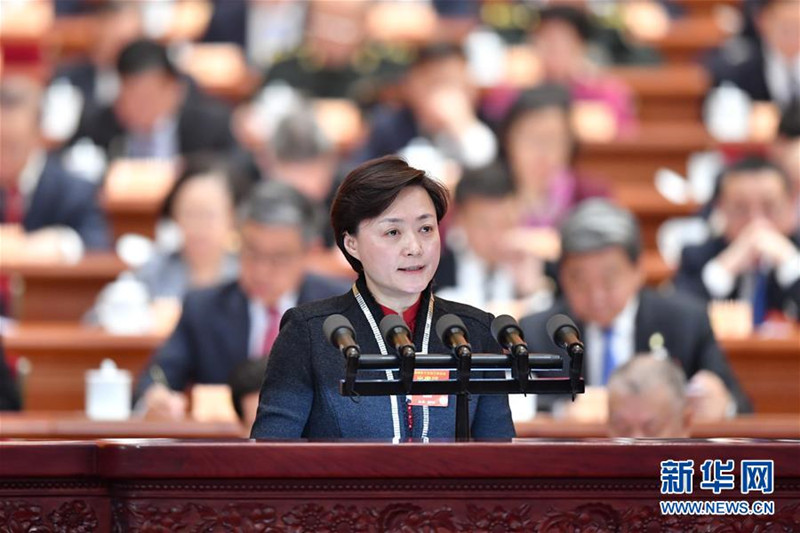Elderly care to continue to play major role in national agenda

Chen Bailing, a CPPCC National Committee member, delivers a speech on measures dealing with elderly care at the grand gathering. [Photo/Xinhua]
The third plenary meeting of the second session of the 13th National Committee of the Chinese People's Political Consultative Conference was held on March 10, 2019 at the Great Hall of the People in Beijing.
Chen Bailing, a CPPCC National Committee member, delivered a speech on measures dealing with elderly care at the grand gathering.
According to official statistics, Chen said, China had 241 million people aged 60 and above by the end of 2017, accounting for 17.3 percent of the total population, which means that one in six people in China is elderly.
Since the 18th Communist Party of China National Congress in 2012, the CPC Central Committee and the State Council have put the promotion of elderly care in an important position, evidenced by the collective study sessions of the Political Bureau of the CPC Central Committee, national comprehensive reform, the 13th Five-Year Plan (2016-20) and policies released by ministries and commissions.
This reflects the CPC Central Committee's firm determination to govern for the people and continuously improve elderly care.
Wang Yang, chairman of the CPPCC National Committee, suggested the CPPCC should continue to discuss issues related to the vital interests of the people, such as improving the elderly care service system.
In recent years, many cities have explored new models of care for the elderly, such as the establishment of clinics in nursing homes, building elderly care service centers in communities and providing medical, food, bathing and other services at home.
Due to the various policies and measures, China has witnessed a significant improvement in the service system, industrial scale, development environment and service quality of its elderly care. By the end of 2018, the country had nearly 30,000 registered elderly care institutions and more than 130,000 community nursing service and facility providers, with a total of 7.4 million beds, double the number at the end of 2012.
Moreover, nearly 23 million elderly people in difficulty had been included in the government's minimum living security system, and provincial-level regions had achieved full coverage of elderly allowances and service subsidies, which has effectively alleviated the many aspects of the aging problem and brought greater benefits to more elderly people.
"In Xuzhou, Jiangsu province, we met an old man who had been bed-ridden for 18 years. His daughter and son-in-law used to take care of him after work which cost so much energy," Chen said.
After a home-based nursing center was built in the community, the father could be cared for and attended to by the center in the short term and would have access to more professional care, she added.
Shanghai, as one of the most prominent cities in the Chinese mainland to address its aging population, is exploring new elderly service models suitable for mega cities. By the end of 2018, the city had 712 nursing institutions with 147,000 beds, 180 comprehensive community service centers, 641 daycare service centers, and 815 community canteens and 5,828 activity rooms for the elderly.
The city has also implemented a partnership program by having 40,000 younger senior volunteers provide assistance to 200,000 older seniors.
China has a rapidly aging society, with the number of people aged 60 and above expected to exceed 300 million by 2025. By then, the challenges around the supply of and demand for elderly care will become more apparent. In response to this problem, Chen made a few suggestions.
First is to promote the professionalization of home-based elderly care services, and to speed up the establishment of a long-term nursing insurance system to reduce the financial burden, according to Chen.
Second is to promote the facilitation of community nursing services. Efforts should be made to develop more urban and rural communities providing old people with services such as day and short-term care, catering, emergency medical assistance, cultural and entertainment services.
Third is to promote the standardization of institutional elderly care, and to establish a related service quality and evaluation system to meet the needs of different groups, such as the elderly living alone and with dementia.
Fourth is to promote the professionalization of service teams by strengthening vocational qualification and skills training. Intelligent care and services such as those provided by robots should also be explored.
Copyright © The National Committee of the Chinese People's Political Consultative Conference.
All rights reserved. Presented by China Daily.
京ICP备08100501号-1

